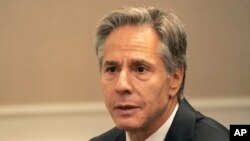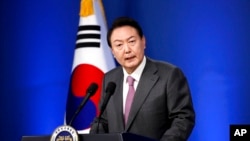U.S. Secretary of State Antony Blinken reiterated Wednesday the United States’ determination to uphold peace and stability across the Taiwan Strait and to ensure that differences between Beijing and Taipei are resolved peacefully.
With regard to Taiwan, the U.S. will be "standing up for the proposition that’s held for decades that these differences need to be managed and resolved peacefully; that there cannot and should not be unilateral changes to the status quo, particularly by force; and that we have an abiding interest in peace and stability in the Taiwan Strait,” Blinken said during an event hosted by Bloomberg News.
“That's a strong basic interest in the United States, and one that we're determined to uphold,” he added.
The top diplomat’s remarks came days after Chinese leader Xi Jinping expanded his own powers and promoted loyalists as he secured a third term as general secretary of the Chinese Communist Party and head of the Central Military Commission.
In his nearly 25,000-word speech over the weekend, Xi told CCP delegates that it was China’s “historic mission and an unshakable commitment” to realize a complete unification and bring Taiwan under Beijing’s control.
U.S. military officials have said Xi may attempt to seize Taiwan by 2027, the 100th birthday of the People’s Liberation Army’s (PLA). But recently, American officials warned that China was accelerating the timeline.
“When we talk about the 2027 window, in my mind, that has to be a 2022 window or potentially a 2023 window. I can’t rule that out. I don’t mean at all to be [an] alarmist by saying that. it’s just that we can’t wish that away,” Admiral Mike Gilday, U.S. chief of naval operations, said at a virtual event hosted by the Atlantic Council on October 19.
Officials in U.S. President Joe Biden’s administration have said Washington is not seeking a decoupling with Beijing. The term refers to progressively severing economic and trade linkages between the U.S. and China and was often heard during the administration of former President Donald Trump.
Defense of values
Blinken, in his remarks Wednesday, envisioned a competitive relationship between the world’s two largest economies in the coming years, adding the U.S. is not seeking to shape internal Chinese politics.
“We don't look for conflict. We don't want a cold war,” he said. “But equally, we're resolute in standing up for our interests, standing up for our values.”
For decades, the U.S. has opposed any unilateral change of the status quo by parties on either side of the Taiwan Strait, a strategic waterway transited every year by a major share of global commerce.
"What's changed is this: the decision by the government in Beijing that the status quo is no longer acceptable, that they wanted to speed up the process by which they would pursue reunification,” said Blinken.
Blinken also addressed a comment this week by South Korean President Yoon Suk Yeol, who said North Korea had finished preparations for what would be its seventh nuclear test since 2006.
Pyongyang this year has launched a record number of missiles, including a ballistic missile that flew over Japan this month.
“It is fair to say that obviously, no one has succeeded in resolving the problem posed by North Korea's nuclear program and the danger it poses to the region,” Blinken said at the Bloomberg event. But he said the U.S. was shoring up “the defensive deterrence capacity” of allies in the region, namely, Japan and South Korea.
The State Department’s No. 2 official, Wendy Sherman, held a trilateral meeting Wednesday with her Japanese and South Korean counterparts to discuss the escalating threats from North Korea. Officials are warning of “an unparalleled scale of response” and consequences should Pyongyang go ahead with a seventh nuclear test.






